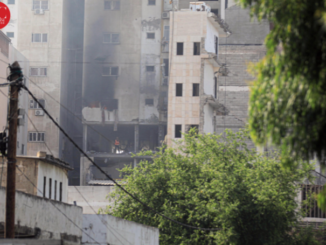By Benay Blend
“As Palestinians,” writes Zarefah Baroud, “we are taught to comply with our oppression for the sake of a peace we won’t be included in. Unlearn this,” she suggests, and moreover, “when a Zionist is elected, you don’t have to cheer. We are entitled to aspirations and agendas for our people’s best interests, just like everybody else.”
From Raphael Warnock, who backtracked his criticism of the Occupation for the sake of a few Zionist votes, to activists who overlooked Biden’s foreign policy in return for a (neo)liberal agenda at home, Baroud exposes the cracks within the solidarity movement. When anti-imperialism got swept away by the overriding goal of defeating Trump, colonized people at home and around the world lost importance.
As a consequence, those who understand colonialism first hand—Palestinians, African Americans, Indigenous populations—found themselves at odds with much of the social justice movement during and after the last election.
According to Onyesonwu Chatoyer, an organizer with the All-African People’s Revolutionary Party and the All-African Women’s Revolutionary Union, even in the realm of domestic policy Biden’s campaign promised very little for the poor and working classes. There is no likelihood of comprehensive criminal justice reform, she writes, nor will there be significant programs to tackle health care, climate change, economic disparity, not to mention all of the other issues that need addressing. Nevertheless, the voter shaming continued, Chatoyer asserts, as “nearly every form of popular media one can consume is plastered with exhortations to vote, vote like your life depends on it, vote because this is the most important election anyone has ever lived through – ever.”
Writing post-election, Erica Caines says much the same. Focusing on internationalism, she warns that a Biden presidency will “attempt to be even more hawkish than the Barack Obama administration in every warmongering, drone-dropping, coup-backing, militarized-policing way.” Significantly, Benjamin Netanyahu and Narendra Modi, both part of “a more extensive global expansion of fascist leadership,” congratulated the president-elect, thereby offering overtures of friendship that Biden could have rejected but didn’t.
“Once Africans in the US understand themselves as colonized people on stolen land,” Caines concludes, “there will be a more precise analysis of how liberation is sought and gained,” much like the aspirations of Palestinians that Zarefah Baroud also described in her comment.
What might prompt liberals to awaken from post-election euphoria? As leading Democrats push for new terror laws to combat white supremacist violence, Manar Waheed, senior legislative and advocacy counsel at the American Civil Liberties Union, warns that new domestic terrorism laws, like the Patriot Act, was used before, most likely will target marginalized groups who have been harassed by the police for years.
“I’m Muslim, and as a Muslim, I completely understand where this response is coming from,” continued Waheed, “where the desire to use the term “domestic terrorism” is coming from. I come from a community that has been treated as a suspect for the entirety of my life, harassed, surveilled, vilified.”
Moreover, she predicted quite correctly that banning Trump on Twitter could be a slippery slope. Indeed, it should have given pause when Biden lumped Antifa, anarchists and white supremacists into one category. As President, Biden promised to round up all accordingly. “I’ve said from the outset of the recent protests,” Biden claimed, “that there is no place for violence or the destruction of property. Peaceful protesters should be protected — but arsonists and anarchists should be prosecuted — and local law enforcement can do that.”
It should have come as no surprise that only a few days ago the Washington Post reported that Twitter has suspended several accounts with “alleged ties” to Antifa. By noting that the ban “follow[ed] the January 6 invasion of the White House, the Post implied that Antifa was responsible for that insurrection, an insinuation that could not be farther from the truth.
As part of Palestine Writes Literature Festival, held online from Dec. 2 -Dec. 6, a panel discussion with Susan Abulhawa, Marc Lamont Hill, and Steven Salaita examined The Cost of Solidarity, i.e. the private and public impact of supporting Palestinian liberation, a topic that has impacted each panelist on a highly personal level.
Reflecting back on the conversation, Abulhawa recalled that “there has never been a moment in our struggle when Palestinian activists did not stand with African American or African liberation struggles. There is a long and rich history of examples spanning political, guerrilla, cultural, material and rhetorical solidarity.”
At a time when marginalized groups of people, along with those in solidarity with them, might soon come under attack, it might do well to rephrase the focus of that panel. The Cost of Rejecting Solidarity might also prove quite high.
According to Otto Fors, the Biden administration does not plan to reverse Trump’s decision to move the US embassy in Israel to Jerusalem. As Fors predicts, this position “signals that the US will continue supporting Israeli’s violent oppression of Palestinians.”
In this framework, continues Fors, the administration might distance itself from Trump, but not his policies regarding support for the Zionist regime. Biden’s recognition of Juan Guaidó as president of Venezuela also illustrates the imperialist mode of his foreign policy in other areas of the globe.
As Erica Caines observes,
“the indifference to wars and occupation is the result of a rupture in the ability for African people to make the connections between a man promising more policing as a campaign strategy during the height of mass uprisings against the police to his aggressive rhetoric towards nations like Venezuela, China, Iran, etc. Nor the US’ role in establishing brutal neocolonial leadership in the Global South and on the Continent.”
For Palestinians and others who have long been crushed under the heel of US imperialism, there is no lesser evil. For those on the left, whether liberal, radical, or otherwise, who profess to hold socialist beliefs, there is no logical way to support the Biden administration.
Moreover, supporting a fundraiser for clean water on the Navajo Nation, but turning our backs on Gaza where there is a water crisis of equal magnitude, no longer works. The cost of not holding true to anti-imperialist policies, as everyone on the left should do, is to be exposed as hypocrites who are in global solidarity against oppression only when it comes with little to no cost to the beholder.
– Benay Blend earned her doctorate in American Studies from the University of New Mexico. Her scholarly works include Douglas Vakoch and Sam Mickey, Eds. (2017), “’Neither Homeland Nor Exile are Words’: ‘Situated Knowledge’ in the Works of Palestinian and Native American Writers”. She contributed this article to The Palestine Chronicle.

– Benay Blend earned her doctorate in American Studies from the University of New Mexico. Her scholarly works include Douglas Vakoch and Sam Mickey, Eds. (2017), “’Neither Homeland Nor Exile are Words’: ‘Situated Knowledge’ in the Works of Palestinian and Native American Writers”. She contributed this article to The Palestine Chronicle.







